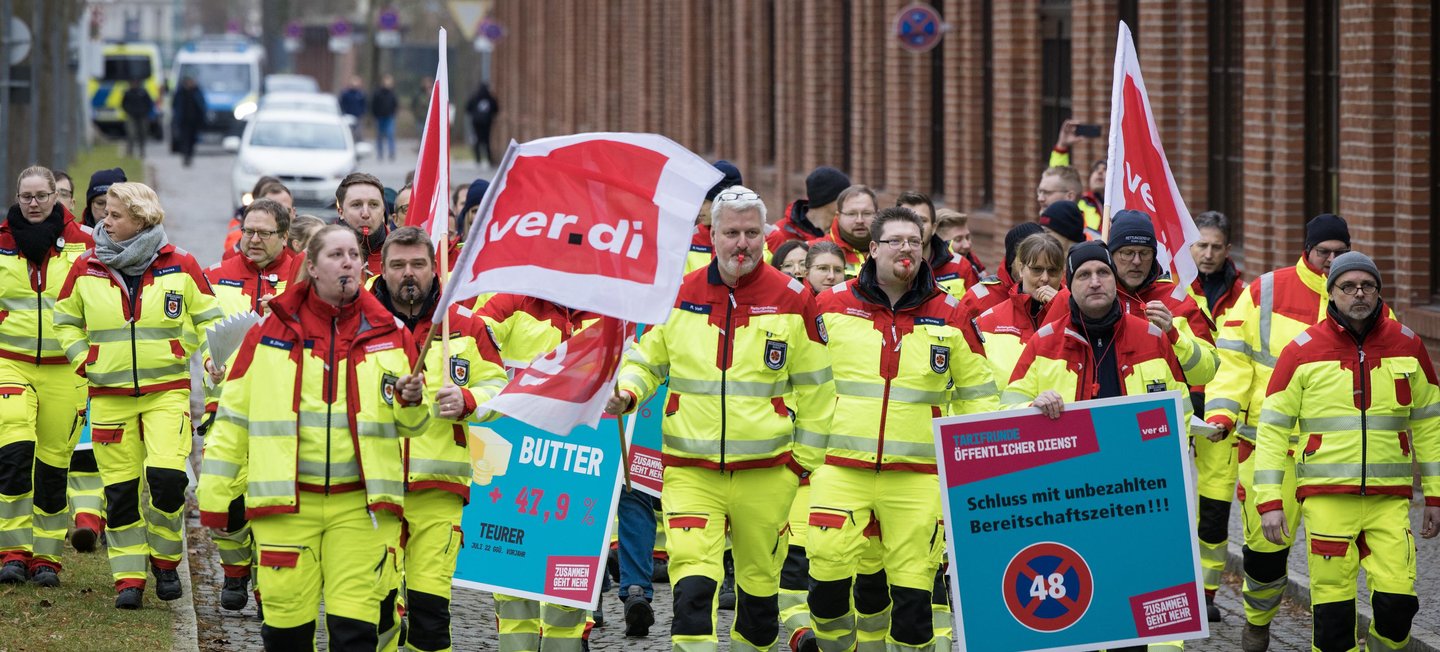
Not a wheel turned in Germany on Monday, as the country was shaken by its largest strike in 30 years. This ‘mega-strike’, organised by two of the country’s biggest unions, brought the German transport system to a complete standstill. The current strike wave in Germany has been building for several months now, with workers winning significant concessions as a result. Monday’s strike represented a turning point that could pave the way for an intensification of the class struggle in what, for many years, was a pillar of stability for European capitalism.
The two unions involved – Germany’s second largest union (ver.di) and the railway and transport union (EVG) – represent between them almost 2.75 million workers. Monday’s strike – which still involved only a small part of that force – included an estimated 155,000 workers, including 30,000 workers in the rail industry, as well as tens of thousands more in airports, docks, motorways and local public transport. Industrial action of this scale has not occurred in Germany since 1992.
The explosive mega-strike, however, did not come out of nowhere. For years, the German working class has been squeezed by the COVID-19 pandemic, the costs of the war in Ukraine, and now the impact of rising inflation. While officially, inflation hit 8.7 percent in February, this hides the fact that German energy prices have risen by over 19 percent and food prices have risen by almost 22 percent.
With the working class facing crippling price rises, the bosses’ offer of a 5 percent pay rise and one-off payments totalling €2500 amounts to a slap in the face. Ver.di and EVG’s demands of a 10.5 percent and 12 percent wage increase respectively, would simply represent the working class maintaining its current standard of living in the face of inflation.
This has not been lost on workers in recent months. The mega-strike was preceded by a series of significant, smaller strikes, which won notable concessions for workers in several sectors. Earlier in the month, postal workers won an 11.5 percent pay rise after 86 percent of their union voted in favour of indefinite strike action. Similarly in November, IG Metall, Germany’s biggest union, won a pay rise of 8.5 percent alongside one-off payments totalling €3000 for the almost 4 million workers it represents, after a two-week series of strikes involving 900,000 workers.
Militant mood
The sudden surge in industrial action has invigorated the militant mood among the working class. One worker, interviewed at a solidarity demonstration in Berlin two days before the strike, told journalists: “Today I put on my extra sturdy shoes, so that I can give the companies a good kick up the arse.”
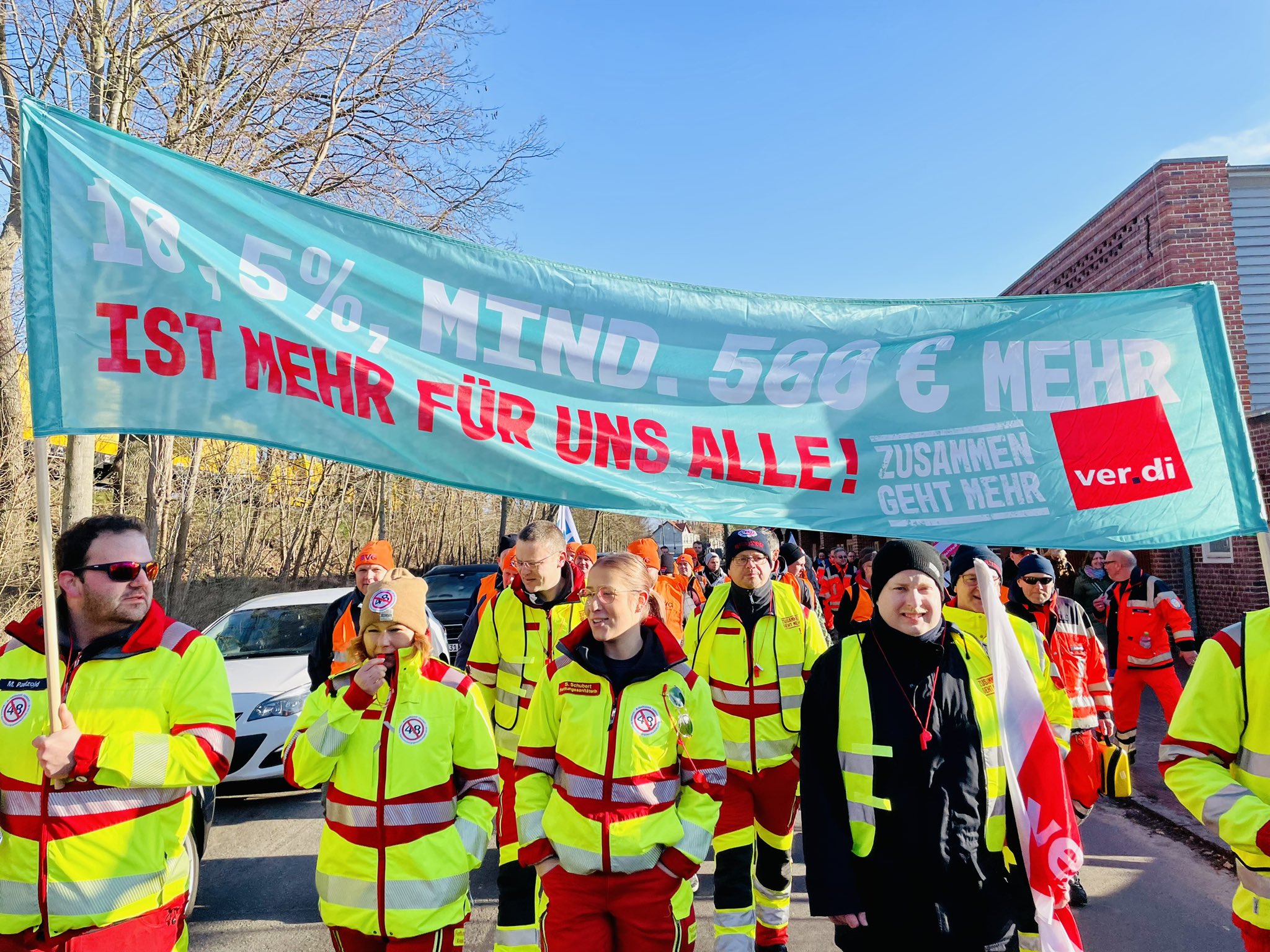
Others connected their anger to their concrete economic situation. As one worker told Agence France-Presse: “Petrol and food prices have risen… I’m feeling it in my wallet.” Another striking worker said the following in an interview:
“We have been dragged along for too long. The big ones benefit and the small ones, who keep everything running, get nothing… People have second or third jobs to make ends meet.”
Slogans such as: “We will not pay for your crisis” have been taken up by strikers and solidarity demonstrations, putting the blame squarely where it belongs – with the ruling class and the crisis-ridden capitalist system.
The fact that workers outside the striking sectors are beginning to recognise their common interests is shown by the level of solidarity expressed by the public. Polls by the German Press Agency put public support for the transport strike at 55 percent. This is despite the significant disruption of daily travel for hundreds of thousands of people, and an extensive campaign of slander against striking workers by the bosses and the right-wing media.
Yet, despite the radical mood among the workers, the leadership of the trade unions were reluctant to organise Monday’s strike. It is clear that the working class in Germany are prepared for an extensive, militant struggle, linking up different sectors in a fight for better pay and conditions. However, the leadership of the trade union movement is trying to tame such an explosive mood in fear it may get out of control.
Already, EVG leaders have excluded the possibility of any further strike action until after Easter. Ver.di, despite some ambiguity from the leadership, will in all likelihood follow suit. This means a period of over two weeks without industrial action for the thousands of workers who were galvanised by Monday’s strike.
Kristian Loroch, who is representing the EVG is their contract negotiations, said that the pause until after Easter was for the sake of train passengers who might want to visit their family over the holiday period. This is a feeble excuse for delaying the strikes and an even feebler excuse for the EVG leadership’s decision to stop even the negotiations themselves during Easter.
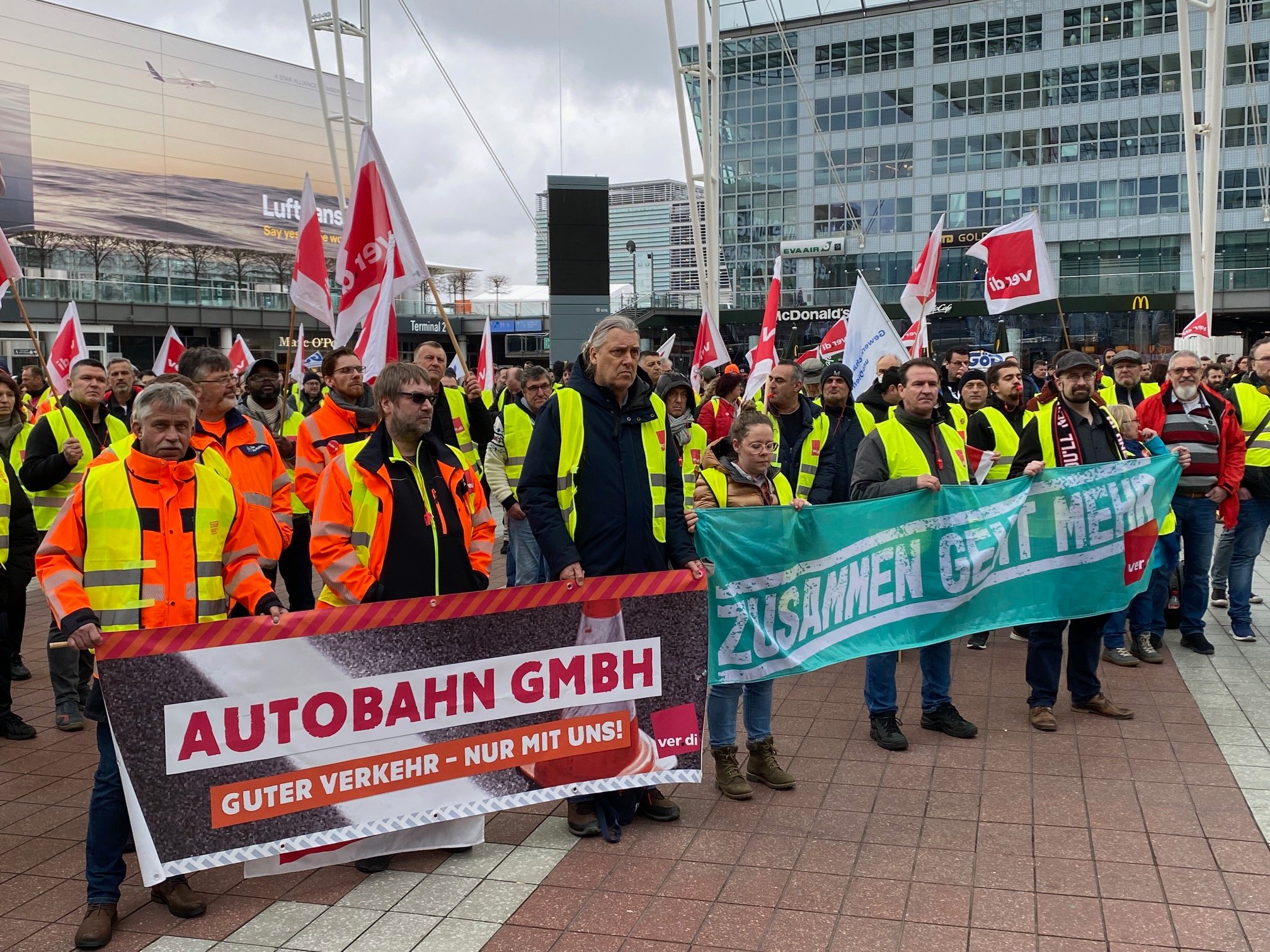
In reality, for the union bureaucrats, the mega-strike was not designed as the opening volley of a united struggle against the bosses, but as a concession to the workers, to relieve the pressure from below. Fearing that the anger of the working class could express itself in something out of the union leadership’s control, the mega-strike was meant as an isolated occasion for the workers to let off steam.
As we previously wrote, the mega-strike cannot be seen as the end goal, or as simply a part of the wider negotiations, but should be the first step in a series of larger actions that reveal the true power that the German working class wields. The trade union leaders thus reveal that they are still trying to preserve friendly relations with the bosses as part of a so-called social partnership – but this is in the past. Moreover, weakness invites aggression. The ruling class on the one hand fears the impact of the full mobilisation of the working class, but on the other is testing the ground, forced by the present crisis, in order to draw a harder line in these negotiations.
France shows the way
While the union leaders try their hardest to de-escalate, the ruling class and their loyal pawns in the bourgeois media have no illusions about where the situation is heading. Gerd Landsberg, head of the German Association of Towns and Municipalities, voiced his criticism by stating: “Monday’s strike is pretty close to a general strike.” Likewise, the Frankfurter Allgemeine Zeitung, one of Germany’s major bourgeois newspapers, published an article shortly before the mega-strike entitled: ‘Warning before the strikes: “France shows where this slippery slope can lead”’.
Comparisons between the current situations in Germany and France can be found everywhere. Whether in the spiteful remarks of bourgeois commentators, desperate to hide their growing concerns, or in the militant slogans of solidarity demonstrations, who rightly see further escalation as the way forward.
Naturally, Monday’s mega-strike did not by any means reach the scale and proportions of the current movement against Macron’s despised pension reforms in France, which drew 3.5 million people onto the streets in a single day, last week, and another 2 million yesterday. Despite this, however, the general tendency is clear, and the impact this strike is having on the consciousness of the German working class and youth is also clear.
Hagen Lesch, from the Cologne Institute for Economic Research, recently stated in an interview that the ‘French strike culture’ is becoming a model for German workers. He added:
“There is a danger here that the boundary between political and collective bargaining strikes will become blurred… I find it worrying that [the German working class] are developing a strike culture that is approaching the French strike culture.”
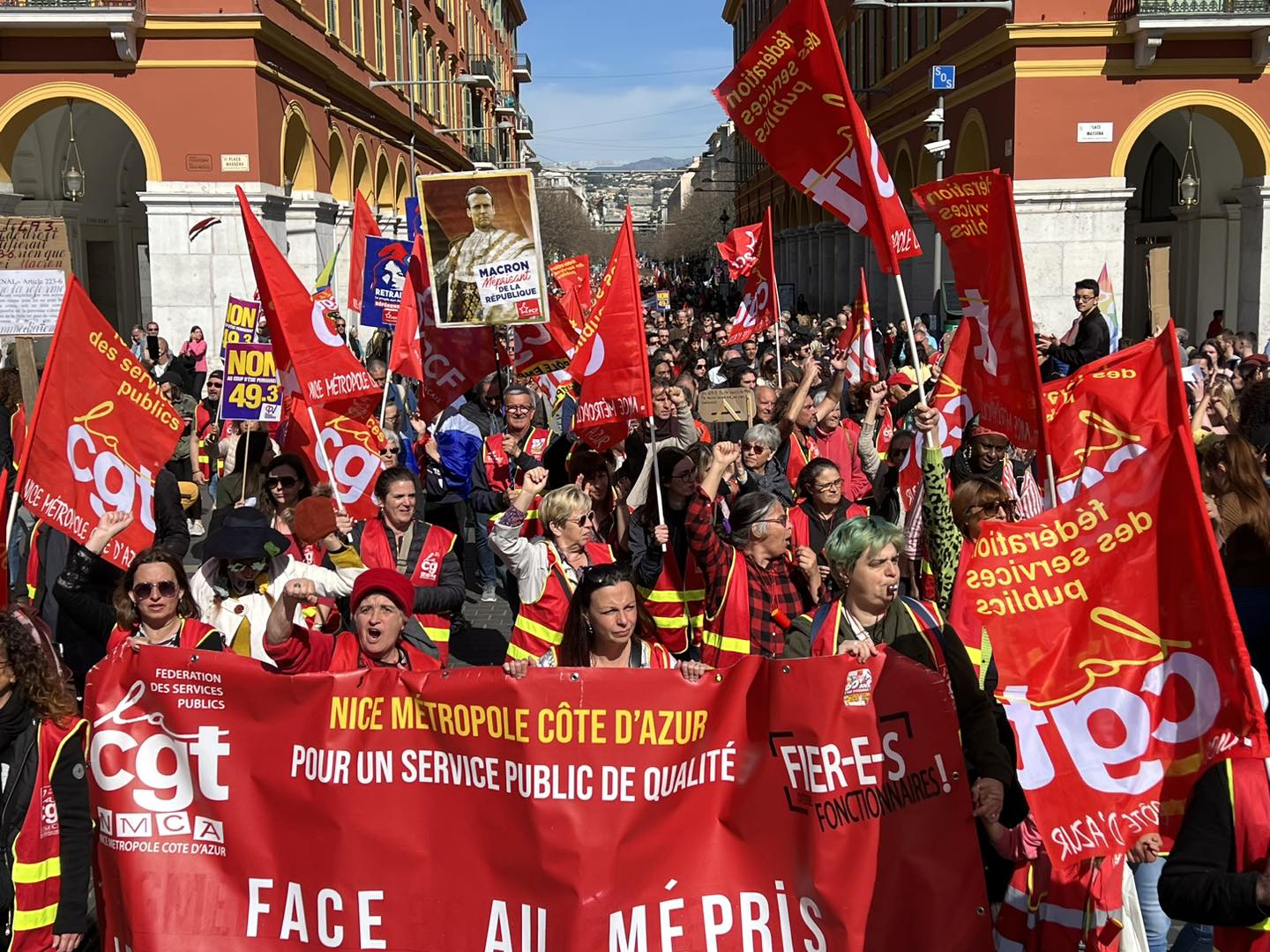
This is a significant warning to the German ruling class from a fearful bourgeois economist. Unlike the ‘hot-headed French’, German workers are not supposed to take militant strike action! But the fact is that the deep crisis of German capitalism has turned a bastion of European political and economic stability into its opposite, and however the bosses and the trade union leaders may attempt to defuse the situation, class struggle is now firmly on the agenda.
The impact of the capitalist crisis is compelling the German working class to flex their muscles in a way that has not been the case for decades. This poses a direct threat to the interests of the capitalist class. Doubtlessly, the German workers will have also paid attention to the inspiring struggle of their brothers and sisters in France as they move into action.
But in reality, what is developing in Germany is not simply a contagion by the ‘French’ virus of class struggle. We have seen a sharp surge of the industrial front in one country after another, in Britain, the USA, Portugal, Finland and elsewhere, as workers facing the cost-of-living crisis turn to the unions to defend their conditions.
The lamentable role of the SPD
Yet the mega-strike does not just reflect the growing confidence of the working class, it has also shown the profound fault lines in the so-called social partnership. The days of ‘moderate’ social democracy, in which the bosses and the workers’ leaders came to underwhelming compromises, are over. Unsurprisingly, Germany’s ruling Social Democratic Party (SPD) has openly confronted striking workers and sided with the bosses to undermine the unions.
Nancy Faeser, the Social Democratic Interior Minister, despite voicing her hollow concerns for “service workers suffering from high energy prices and high inflation” went on to add that the unions have been “presented a good offer” and stated: “I expect the unions to move away from their high demands and meet us somewhere along the way.”
No doubt it will reassure the workers little to know that even though they are being asked to accept a significant real-terms wage cut, the SPD at least ‘sympathises’ with them!
Karin Welge, an SPD mayor and President of the The Union of Municipal Employers’ Associations (VKA) – the reactionary body negotiating on behalf of the bosses – was even more open in her disdain for the trade unions. Welge has openly derided the mega-strike as ‘completely excessive’, stating that it “damages not only the reputation of the public sector, but overall the reputation of Germany as a business location.” These are not the words of a business owner or a right-wing politician, but a self-proclaimed social democrat!
What is abundantly clear is that the ruling SPD has fully taken the side of the bosses in the current struggle, and has no intention of reaching an amicable compromise with the trade union leadership. Importantly, though, this is not simply a poor choice on behalf of individual politicians, but a necessary result of the capitalist crisis. With the German economy under increasing strain and subject to the global instability of the world market, the reforms and concessions of previous periods are now unachievable on terms that would be acceptable to the capitalists.
The social partnership of the past, in which the SPD and the trade union leaders could mediate a compromise between the capitalists and the workers, is crumbling under the weight of capitalism’s contradictions.
A new turning point
The attitude of the SPD in government towards the legitimate demands of the German workers, that is to say, their domestic policy, reflects their subordination to the interests of the German capitalists in foreign policy. Earlier this year, Chancellor Olaf Scholz announced a ‘turning point’, stating that the war in Ukraine had opened up a new epoch, and therefore Germany must embrace a turn towards rearmament and the strengthening of its interests; that is, Germany must aggressively pursue its own imperialist interests. While ordinary people suffer real-terms wage cuts, it seems there is plenty of money for weapons of war.
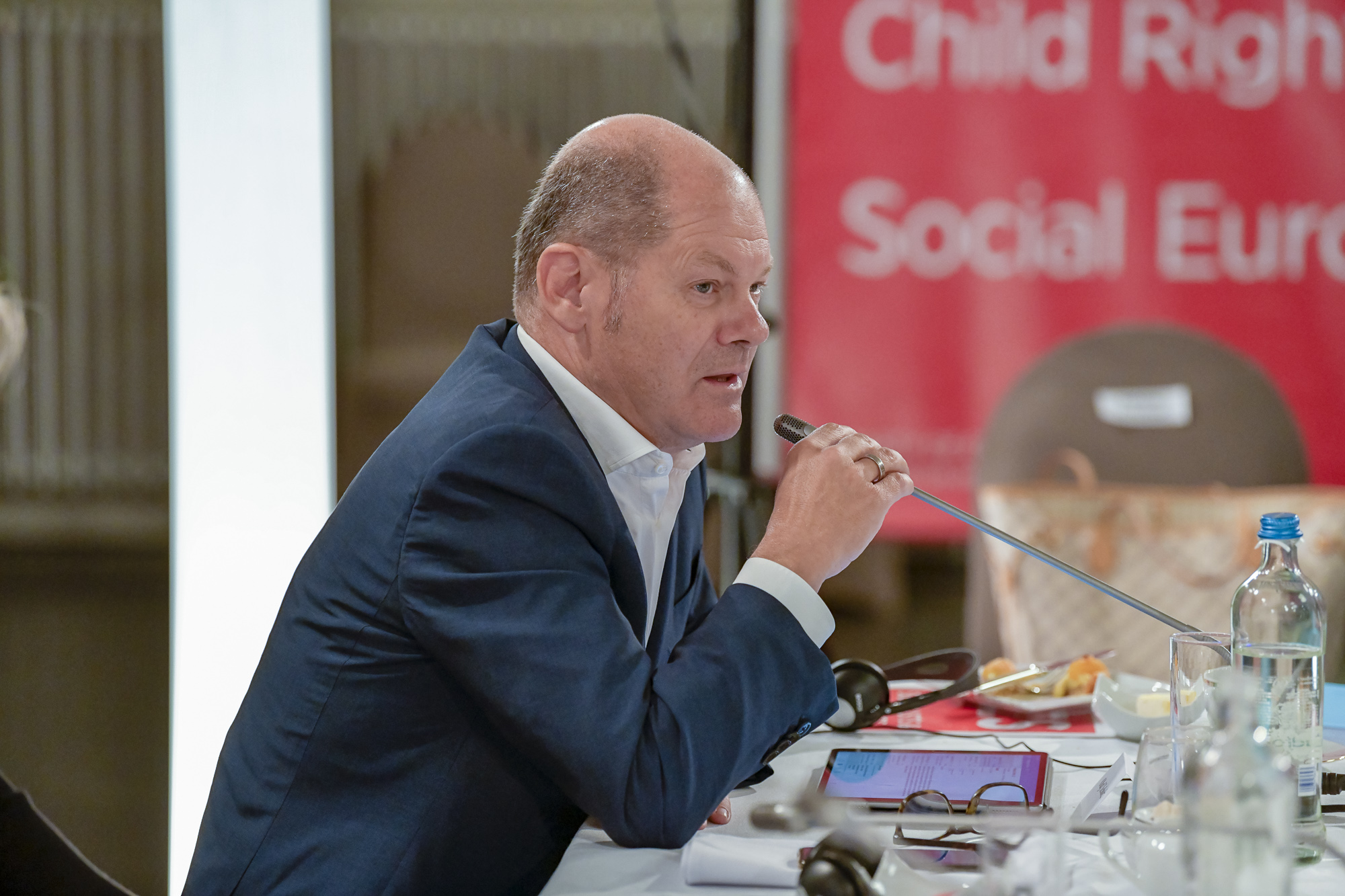
Last year, the German parliament voted to approve a €100bn increase in defence spending, all while German workers feel the pinch of inflation. At the same time, the German ruling class has been increasingly dragged towards greater and greater involvement in the US-led proxy war in Ukraine between NATO and Russia, having just delivered 18 Leopard tanks to the Ukrainian army. This conflict has severely impacted German energy prices, battering industry and exacting misery on households.
If it is to repel further attacks, the German working class must mark its own ‘turning point’, and open up a period of struggle.
Germany is a key nation in both Europe and the world economy. As the working class in Germany regains its confidence and moves on a greater and greater scale, it will have an enormous impact on consciousness throughout Europe. Similarly, as the crisis of German capitalism develops, it will only drag its ailing neighbours down with it.
This sets the stage for a monumental struggle, but one that requires a leadership that is conscious of the tasks ahead of it. Currently, the representatives of the working class in the leadership of the trade unions are unwilling and unable to play the necessary role.
Monday’s mega-strike showed the potential that for a long time lay dormant in Germany’s working class, but it also showed the unwillingness of the union leaders to unleash it. They don’t believe an alternative to the present situation can be reached by means of the class struggle. The answer to the problems of the working class is not going to come from peaceful compromises with the bosses. The workers’ demands will be won in their entirety only through an intensification of the class struggle.
To that end, the movement must be broadened, and different layers of the working class should be unified through joint action. Compromises and a reheated social partnership are the path to demoralisation and betrayal. Determined class struggle, involving the broadest possible layer of the workers, can not only achieve the demands of the transport workers in the current dispute, but lay the basis for much more.
Regardless of the trade union leaders’ present orientation, a new phase is opening where the workers and youth in Germany, in common with workers and youth throughout the world, are entering the struggle, testing their strength and drawing more advanced conclusions.
As the German working class enters a new phase of class struggle, the power that ultimately lies in their hands will become apparent. Any provocation by the ruling class will be met by stronger mobilisations. This has the potential to develop into a powerful wave of strike action, and show once and for all that it is the workers who create all value in society, and deserve to utilise it for the benefit of the majority. The working class is reawakening under the whip of the crisis, in Germany as in the rest of the world. It will not be easy for the ruling class to push it back into a state of passivity.

